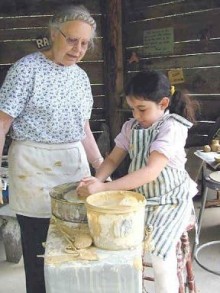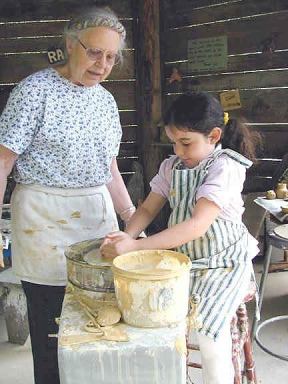Restoration and stewardship on private property
— from Jill Clark, Development Director, Northwest Straits Foundation —
West Beach Creek property owner Dianna Down reminisced about her mom, long‐time Orcas Island potter Trudy Erwin, who died in 2013 at age 90. Erwin was inspired to restore a fish passage and improve habitat on her shoreline property. Her daughters are committed to bringing Erwin’s wishes to fruition in partnership with Northwest Straits Foundation:
Please share your family’s connection to the West Beach Creek property and to Orcas Island. My Mom and grandmother used to spend summers in the islands and had a chance to buy Orcas Island Pottery in 1953. My grandmother ‐ Julia Crandall, made pottery until the late 1970s when she passed the business along to my sister, Sydney Exton, who runs it today. About the same time, my mom ‐ Trudy Erwin, bought this property and set up her own pottery, The Right Place, just down West Beach from OIP. The name for ‘The Right Place’ came from a play on words from the developer’s name, C. R. Wright.
Mom was a generous, grateful person. She shared her love of life with others, especially children. The Right Place was a place of self‐discovery. She taught adults and kids to make their own pottery ‐ very personal pots, charging little or nothing. “We miss your Mom,” vacationers will stop and say. “We used to come make pots every summer.” She instilled a love of art and nature. Kids would wander down and create magic wonderlands with seaweed and driftwood on the beach.
I like to think that the women in my family not only helped to create an Orcas island legacy of an artistic sort, but now we have an opportunity to create a conservation legacy as well. My mom, who passed last year at age 90, loved this land. Even though it’s modest and so were we, she would often say, “Oh, my gosh! Look at this beautiful place. We live like millionaires!”
What was your mom’s dream for the property, for West Beach Creek and for the beach? When Mom and my step‐father Wally bought the property in 1978, they put in the culvert and dammed up the creek so we would have a swimming hole. They thought it would be something we’d all use and enjoy. It was great at first. But the dam slowed the water flowing in the creek. It quickly became muddy and became a much better swimming hole for turtles, river otter, birds, deer, and other critters who settled in.
I think my Mom felt a little guilty. As someone who thought a lot about the next generation, she felt responsible for doing what she could to make the world a better place. After Wally died she learned that she could work with a nonprofit conservation group to restore the fish passage and improve the beach on her property. She was intrigued by the project. My sister was in on several conversations from the beginning, and we encouraged my Mom to move forward.
She was pleased that as a private property owner she could work with others to restore salmon habitat that would have an impact far beyond the shores of her property. It was empowering and exciting. Of course, it took time and funding, but here we are, nearly ready to start construction in partnership with Northwest Straits Foundation.
What are the benefits your Mom hoped would result from the West Beach Creek restoration? She would be grateful to know that removing the culvert will allow the creek to run faster again onto the beach and that the stream quality will improve. She would be delighted to see the fish come back and use the creek. But she would also hope that the birds and turtles will stick around after the pond is gone. As an artist, she would appreciate the aesthetic improvements. Just knowing the creek going back to the way it’s supposed to be – free‐flowing and unobstructed.
My Native American neighbor says she remembers catching salmon in the creek when she was a kid before the culvert went in. Mom would be so thrilled to hear her tell us she is catching fish there again.
What would you say to other private property owners considering working with Northwest Straits Foundation to restore their shoreline property? It’s a win‐win‐win: The ecosystem wins. Future generations win. The property owner wins.
And when I say the property owner wins, I mean it in the best way: We are excited and grateful that this opportunity came our way. Even if we had thought, “Wow, wouldn’t it be great to get rid of this culvert, restore the creek and hope the salmon come back,” we wouldn’t have known who to contact, and what was possible, and that science backs up the work. We appreciate that Northwest Straits Foundation is making this possible for us, for the environment, and to honor my mother’s commitment to take care of the place she called home.
Just like any opportunity, there are trade‐offs. But if you believe in it, it’s worth the small inconveniences during construction. You won’t make money off the project, but you might get a new road!
Any parting thoughts? This project is my mom’s legacy. She lived her life believing we should do what we can to care for the natural world, use only what we need, and pass on a love of beauty and nature to the next generation. We’re caretakers of her vision. We want to make sure this project is completed and her legacy lives on.
**If you are reading theOrcasonian for free, thank your fellow islanders. If you would like to support theOrcasonian CLICK HERE to set your modestly-priced, voluntary subscription. Otherwise, no worries; we’re happy to share with you.**










This is a great thing Trudy was an Awesome women and a great help in my past business Osprey Tours. The stream quality has long been a concern. I had Surf Rider Foundation do water quality test and it was high in human waste particularly due to faulty septics up stream. I trie to bring it to the attention of the county to no avail. My concern was all the children who played in the little stream at the outlet at the public access there. So this is a Great thing. Happy to see it come about.